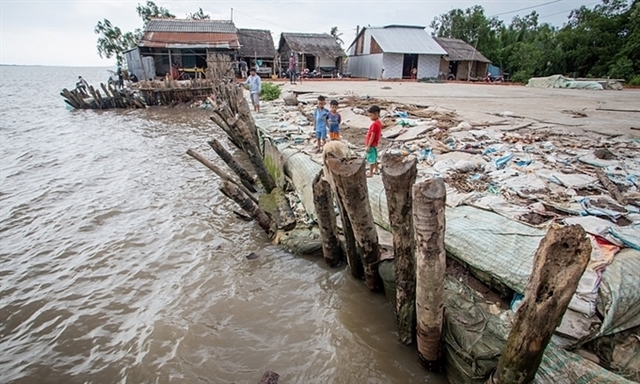.jpg) Environment
Environment
.jpg)
The southernmost province of Cà Mau is planning to spend more than VNĐ19 trillion (US$819.56 million) on 55 “priority” projects that address climate change and natural disaster prevention.

|
| Due to the impact of climate change, riverbank and coastal erosion in the southernmost province of Cà Mau has increased in recent years. — VNS Photo Văn Châu |
HCM CITY — The southernmost province of Cà Mau is planning to spend more than VNĐ19 trillion (US$819.56 million) on 55 “priority” projects that address climate change and natural disaster prevention.
Of the amount, VNĐ18.178 trillion ($784.1 million) will come from the central budget and Official Development Assistance (ODA) and VNĐ207.5 billion from the province’s revenue, with the rest from the National Target Programme to Respond to Climate Change, according to the provincial People’s Committee.
Under an action plan for the 2021 – 2030 period, the province will implement 55 projects that aim to improve the forecasting of natural disasters and enhance residents’ awareness about natural disaster prevention and climate change adaptation.
The projects will also address the impact caused by landslides, subsidence, urban flooding, drought, water shortages, and saline intrusion.
Climate-change response measures for various industries, fields and localities will be proposed.
The provincial People’s Committee has also asked ministries and agencies to adjust production planning, including in freshwater areas that often suffer inundation in the rainy season and saltwater intrusion and drought in the dry season.
Conservation of the ecosystem of U Minh Hạ forest, where climate change has had a severe impact, will also be studied.
Erosion
Cà Mau has 46 riverbank and six coastal areas that are classified as severe erosion hotspots. A combined 105 km of riverbank and coastal areas have been eroded, according to the provincial agriculture department.
Erosion of about 30m-50m every year caused by rivers occurs in Năm Căn, Phú Tân, Cái Nước, Ngọc Hiển, Đầm Dơi, and U Minh districts, while coastal erosion is occurring in U Minh forest.
The erosion rate of riverbanks in Cà Mau has been 0.3-0.5m per year since 2017, according to the province’s People’s Committee.
Local authorities said climate change has worsened erosion in recent years. Over the past 10 years, the province has lost more than 8,800ha of coastal forests.
In the past decade, Cà Mau has lost 300-400ha of protective forests per year because of human causes, according to the department’s Division for Natural Disaster Prevention.
Climate change is becoming increasingly complex in the Mekong Delta, the country’s rice and fruit basket and its biggest aquaculture production hub, experts have said.
Cà Mau is listed as one of the most vulnerable localities to climate change in the region.
According to one climate change scenario, if the sea level rises by 25cm, about 85.4 per cent (or 4,700sq.m) of the total natural area of the province will be inundated, and about 200,000 households will be displaced by 2040.
Without appropriate measures to alleviate subsidence, the Mekong Delta could cease to exist in 100 years, experts have warned. — VNS
.jpg)



